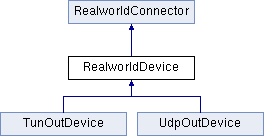RealworldDevice is a pseudo interface that allows communcation with the real world through the TunOutScheduler. More...
#include <RealworldDevice.h>

Public Member Functions | |
| virtual int | numInitStages () const |
| virtual void | initialize (int stage) |
| Initialization of the module. | |
 Public Member Functions inherited from RealworldConnector Public Member Functions inherited from RealworldConnector | |
| RealworldConnector () | |
| virtual | ~RealworldConnector () |
| virtual void | handleMessage (cMessage *msg) |
| The "main loop". | |
Protected Member Functions | |
| InterfaceEntry * | registerInterface () |
| Register the interface in the interface table of the parent. | |
 Protected Member Functions inherited from RealworldConnector Protected Member Functions inherited from RealworldConnector | |
| virtual void | transmitToNetwork (cPacket *msg) |
| Send a message to the (realworld) network. | |
| virtual void | updateDisplayString () |
| virtual char * | encapsulate (cPacket *msg, unsigned int *length, sockaddr **addr, socklen_t *addrlen)=0 |
| Converts an IP datagram to a data block for sending it to the (realworld) network. | |
| virtual cPacket * | decapsulate (char *buf, uint32_t length, sockaddr *addr, socklen_t addrlen)=0 |
| Parses data received from the (realworld) network and converts it into a cMessage. | |
| virtual bool | isApp () |
| If the Connector connects to an application, this method has to be overwritten to return "true". | |
Protected Attributes | |
| InterfaceEntry * | interfaceEntry |
 Protected Attributes inherited from RealworldConnector Protected Attributes inherited from RealworldConnector | |
| int | gateIndexNetwOut |
| unsigned int | mtu |
| long | numSent |
| long | numSendError |
| long | numRcvdOK |
| long | numRcvError |
| cMessage * | packetNotification |
| PacketBuffer | packetBuffer |
| RealtimeScheduler * | scheduler |
| PacketParser * | parser |
Detailed Description
RealworldDevice is a pseudo interface that allows communcation with the real world through the TunOutScheduler.
WARNING: This does ONLY work with the combination IPv4|UDP|OverlayMessage
Definition at line 38 of file RealworldDevice.h.
Member Function Documentation
|
virtual |
Initialization of the module.
Registers the device at the scheduler and searches for the appropriate payload-parser Will be called automatically at startup
Reimplemented from RealworldConnector.
Definition at line 27 of file RealworldDevice.cc.
|
inlinevirtual |
Reimplemented from RealworldConnector.
Definition at line 51 of file RealworldDevice.h.
|
protected |
Register the interface in the interface table of the parent.
- Returns
- A pointer to the Interface entry
Definition at line 39 of file RealworldDevice.cc.
Referenced by initialize().
Member Data Documentation
|
protected |
Definition at line 42 of file RealworldDevice.h.
Referenced by initialize().
The documentation for this class was generated from the following files:
